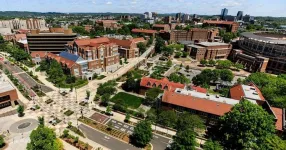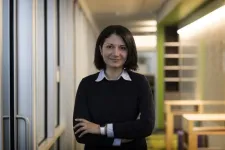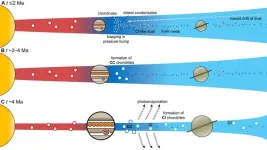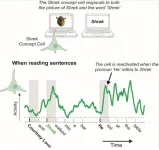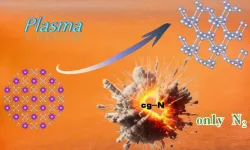(Press-News.org) Center for BrainHealth® at The University of Texas at Dallas has received a major match gift commitment from retired U.S. Navy four-star admiral and former University of Texas System chancellor William McRaven and his wife Georgeann. Adm. McRaven recently received the 2024 Bezos Courage & Civility Award presented by Amazon founder Jeff Bezos and Lauren Sánchez.
The $2 million challenge grant will support Optimal BrainHealth for Warfighters – including active-duty military, spouses and veterans. This program will help those with traumatic brain injury (TBI), post-traumatic stress (PTS) and similar issues, as well as building resilience ahead of deployment. It will provide critical training for proactive brain health and introduce essential tools to measure and track change over time, especially improvement. The challenge doubles the gift's impact by inviting the public to play a pivotal role in empowering our fighting men and women as well as veterans to build brain fitness and resilience.
“We are deeply grateful for Admiral and Mrs. McRaven’s tremendous and timely gift, which recognizes both our science-backed approach to proactive brain health, as well as our expansive, results-based experience working with all branches of the military, spouses and veterans,” said Center for BrainHealth chief director Sandra Bond Chapman, PhD. “This gift specifically allows us to concentrate efforts in deploying our brain health breakthroughs to benefit our service members who are willing to sacrifice their lives for our freedom.”
An Urgent Need
Active duty and veteran warriors routinely face challenges related to the high-pressure, intense nature of their professions, including how to transition to their time off. Interrelated health and functional impairments can emerge, such as the effects of traumatic brain injury (TBI), post-traumatic stress (PTS), sleep disturbance, long-term pain, addiction, depression and suicide, among others.
Optimal BrainHealth for Warfighters capitalizes on neuroplasticity to continually optimize brain performance and build cognitive reserve prior to any brain-related event, AND to enhance resilience that helps the individual rebound more quickly.
“We support the remarkable work being done by the Center for BrainHealth in strengthening brain performance for both veterans and active-duty military and their families,” said Adm. and Mrs. McRaven. “A brain that can think critically, that can function under stress, a brain that is resilient in the face of trauma, a brain that is creative, that is thoughtful, that is socially active… we all need and want that kind of brain.”
More About Optimal BrainHealth for Warfighters
Military operators never stop training so they can stay physically fit and constantly ready for action. Center for BrainHealth brings a similar, proactive approach to motivate brain fitness.
The program’s robust offerings feature the following:
BrainHealth Index, a precision brain performance assessment: The BrainHealth Index measures and monitors an individual’s changes in holistic brain health (either up or down) over time. Charting change spurs self-motivation to strive for improvements and determination to detect and rebound from any declines. The Index, is a first-of-its-kind composite score derived with a proprietary algorithm across a wide array of validated assessments, providing a unique focus on the brain’s lifelong ability to improve – unlike most other assessments that are developed to detect and diagnosis problems.
Strategic Memory Advanced Reasoning Tactics (SMART™) brain strategy training: This evidence-based training protocol emphasizes executive brain functions that guide strategic attention, critical reasoning and innovation. The training strengthens the brain’s remarkable capacity to continually:
Hone clarity of thinking
Enhance the ability to quickly turn complex inputs into insightful actions
Promote emotional balance in adversity and unpredictability
Upgrade empathetic connections to team members, loved ones, and sense of purpose
Rewire itself to enhance brain performance, even years after suffering a brain-related event
Proposed collaborations to train and certify POTFF (Preservation of Force and Family) and/or NICoE (National Intrepid Center of Excellence) personnel as BrainHealth Coaches at regional combat commands and Special Operations Command (SOCOM) bases: Sessions can be integrated into Force Readiness programs and offered during chronic stages post-injury, complementing acute care received for brain-related events or injuries.
Continual brain fitness building with access to online training and habit reinforcement via the BrainHealth App.
A Timely Challenge to Donors
The Center will be raising funds to be matched through July 31, 2025.
To further spur donations that will be matched by this gift, the Center is focused on Optimal BrainHealth for Warfighters during this year’s North Texas Giving Day, the largest and most successful online giving initiative in the U.S., which took place through September 19.
If interested in making a donation, please contact Gail Cepak at gail.cepak@utdallas.edu or 972-883-3408.
# # #
ABOUT CENTER FOR BRAINHEALTH
Center for BrainHealth®, part of The University of Texas at Dallas, is a translational research institute committed to enhancing, preserving, and restoring brain health across the lifespan. Major research areas include the use of functional and structural neuroimaging techniques to better understand the neurobiology supporting the continual growth of cognition, well-being and social connections in health and disease. This leading-edge scientific exploration is translated quickly into practical innovations to improve how people think, work and live, empowering people of all ages to thrive and unlock their brain potential. Translational innovations leverage 1) the BrainHealth Index, a proprietary measure that uniquely charts one’s upward (or downward) holistic brain health trajectory whatever their starting level; and 2) Strategic Memory Advanced Reasoning Tactics (SMART™) brain training, a strategy-based toolkit developed and tested by BrainHealth researchers and other teams over three decades.
END
Center for BrainHealth receives $2 million match gift from Adm. William McRaven (ret.), recipient of Courage & Civility Award
Funds will enhance programs supporting brain health for active-duty military and veterans.
2024-09-27
ELSE PRESS RELEASES FROM THIS DATE:
Circadian disruption, gut microbiome changes linked to colorectal cancer progression
2024-09-27
Irvine, Calif., Sept. 27, 2024 — Research from the University of California, Irvine has revealed how disruption of the circadian clock, the body’s internal, 24-hour biological pacemaker, may accelerate the progression of colorectal cancer by affecting the gut microbiome and intestinal barrier function. This discovery offers new avenues for prevention and treatment strategies.
The study, published online today in the journal Science Advances, offers a more comprehensive understanding of how important changes occur in the function and composition of the gut microbiome when the circadian clock is disturbed in the presence ...
Grant helps UT develop support tool for extreme weather events
2024-09-27
The University of Tennessee and the UT Institute of Agriculture have received a $434,038 Seeding Solutions grant from the Foundation for Food & Agriculture Research (FFAR) to develop and test a decision support tool for farmers to better manage crop production from risks of extreme weather events across the Tennessee River Basin and surrounding southeast US regions.
UT is providing matching funds for a total investment of $966,119 over the three-year project.
The U.S. Department of Agriculture estimates that extreme weather is responsible for 90% of crop losses. These estimates are generally based on annual climate conditions. ...
Autonomous vehicles can be imperfect — As long as they’re resilient
2024-09-27
Researchers from three of Virginia’s premier universities, including the University of Virginia’s Homa Alemzadeh, aim to take the risk out of self-driving vehicles by overcoming inevitable computer failures with good engineering.
The trio will share a $926,737 National Science Foundation award to identify when and where autonomous vehicle systems are most vulnerable to safety-critical failures. They plan to use this knowledge to design ways to efficiently mitigate potential safety hazards and enhance the overall system resilience.
Alemzadeh, an associate professor of electrical and computer engineering in UVA’s School of Engineering and Applied ...
Asteroid Ceres is a former ocean world that slowly formed into a giant, murky icy orb
2024-09-27
Since the first sighting of the first-discovered and largest asteroid in our solar system was made in 1801 by Giuseppe Piazzi, astronomers and planetary scientists have pondered the make-up of this asteroid/dwarf planet. Its heavily battered and dimpled surface is covered in impact craters. Scientists have long argued that visible craters on the surface meant that Ceres could not be very icy.
Researchers at Purdue University and the NASA's Jet Propulsion Lab (JPL) now believe Ceres is a very icy ...
McMaster researchers discover what hinders DNA repair in patients with Huntington’s Disease
2024-09-27
Researchers with McMaster University have discovered that the protein mutated in patients with Huntington’s Disease doesn't repair DNA as intended, impacting the ability of brain cells to heal themselves.
The research, published in PNAS on Sept. 27, 2024, found that the huntingtin protein helps create special molecules that are important for fixing DNA damage. These molecules, known as Poly [ADP-ribose] (PAR), gather around damaged DNA and, like a net, pull in all the factors needed for the repair process.
In people with Huntington’s Disease, however, the research found that the mutated version of this protein doesn’t function properly ...
Estrogens play a hidden role in cancers, inhibiting a key immune cell
2024-09-27
DURHAM, N.C. – Estrogens are known to drive tumor growth in breast cancer cells that carry its receptors, but a new study by Duke Cancer Institute researchers unexpectedly finds that estrogens play a role in fueling the growth of breast cancers without the receptors, as well as numerous other cancers.
Appearing Sept. 27 in the journal Science Advances, the researchers describe how estrogens not only decrease the ability of the immune system to attack tumors, but also reduce the effectiveness of immunotherapies that are used to treat many cancers, notably triple-negative breast cancers. Triple-negative ...
A new birthplace for asteroid Ryugu
2024-09-27
In December 2020 the space probe Hayabusa 2 brought samples of asteroid Ryugu back to Earth. Since then, the few grams of material have been through quite a lot. After initial examinations in Japan, some of the tiny, jet-black grains traveled to research facilities around the world. There they were measured, weighed, chemically analyzed and exposed to infrared, X-ray and synchroton radiation, among other things. At the MPS, researchers examine the ratios of certain metal isotopes in the samples, as in the current study. Scientists refer to isotopes as variants of the same element that differ only in the number of neutrons in the nucleus. Investigations ...
How are pronouns processed in the memory-region of our brain?
2024-09-27
A new study shows how individual brain cells in the hippocampus respond to pronouns. “This may help us unravel how we remember what we read.”
Read the following sentence: “Donald Trump and Kamala Harris walked into the bar, she sat down at a table.” We all immediately know that it was Kamala who sat at the table, not Donald. Pronouns like “she” help us to understand language, but pronouns can have multiple meanings. Depending on the context, we understand who the pronoun is referring to. But ...
Researchers synthesize high-energy-density cubic gauche nitrogen at atmospheric pressure
2024-09-27
Recently, a research group led by Prof. WANG Xianlong from the Hefei Institutes of Physical Science of the Chinese Academy of Sciences, successfully synthesized high-energy-density materials cubic gauche nitrogen (cg-N) at atmospheric pressure by treating potassium azide (KN3) using the plasma-enhanced chemical vapour deposition technique (PECVD).
The research results were published in Science Advances.
Cg-N is a pure nitrogen material consisting of nitrogen atoms bonded by N-N single bonds, resembling the structure of diamond. It has attracted attention because it has a high-energy-density and produces only nitrogen gas when it decomposes. ...
Ancient sunken seafloor reveals earth’s deep secrets
2024-09-27
University of Maryland scientists uncovered evidence of an ancient seafloor that sank deep into Earth during the age of dinosaurs, challenging existing theories about Earth’s interior structure. Located in the East Pacific Rise (a tectonic plate boundary on the floor of the southeastern Pacific Ocean), this previously unstudied patch of seafloor sheds new light on the inner workings of our planet and how its surface has changed over millions of years. The team’s findings were published in the journal Science Advances on September 27, 2024.
Led by geology postdoctoral researcher Jingchuan Wang, the team used innovative seismic imaging techniques to ...
LAST 30 PRESS RELEASES:
New ‘scimitar-crested’ Spinosaurus species discovered in the central Sahara
“Cyborg” pancreatic organoids can monitor the maturation of islet cells
Technique to extract concepts from AI models can help steer and monitor model outputs
Study clarifies the cancer genome in domestic cats
Crested Spinosaurus fossil was aquatic, but lived 1,000 kilometers from the Tethys Sea
MULTI-evolve: Rapid evolution of complex multi-mutant proteins
A new method to steer AI output uncovers vulnerabilities and potential improvements
Why some objects in space look like snowmen
Flickering glacial climate may have shaped early human evolution
First AHA/ACC acute pulmonary embolism guideline: prompt diagnosis and treatment are key
Could “cyborg” transplants replace pancreatic tissue damaged by diabetes?
Hearing a molecule’s solo performance
Justice after trauma? Race, red tape keep sexual assault victims from compensation
Columbia researchers awarded ARPA-H funding to speed diagnosis of lymphatic disorders
James R. Downing, MD, to step down as president and CEO of St. Jude Children’s Research Hospital in late 2026
A remote-controlled CAR-T for safer immunotherapy
UT College of Veterinary Medicine dean elected Fellow of the American Academy of Microbiology
AERA selects 34 exemplary scholars as 2026 Fellows
Similar kinases play distinct roles in the brain
New research takes first step toward advance warnings of space weather
Scientists unlock a massive new ‘color palette’ for biomedical research by synthesizing non-natural amino acids
Brain cells drive endurance gains after exercise
Same-day hospital discharge is safe in selected patients after TAVI
Why do people living at high altitudes have better glucose control? The answer was in plain sight
Red blood cells soak up sugar at high altitude, protecting against diabetes
A new electrolyte points to stronger, safer batteries
Environment: Atmospheric pollution directly linked to rocket re-entry
Targeted radiation therapy improves quality of life outcomes for patients with multiple brain metastases
Cardiovascular events in women with prior cervical high-grade squamous intraepithelial lesion
Transplantation and employment earnings in kidney transplant recipients
[Press-News.org] Center for BrainHealth receives $2 million match gift from Adm. William McRaven (ret.), recipient of Courage & Civility AwardFunds will enhance programs supporting brain health for active-duty military and veterans.

